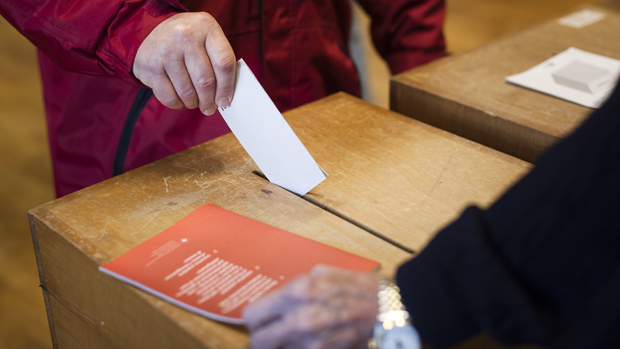Switzerland out in the cold after EU immigration vote
'All eyes will be on the reaction from Brussels' as Switzerland votes to limit immigration from the EU

A free daily email with the biggest news stories of the day – and the best features from TheWeek.com
You are now subscribed
Your newsletter sign-up was successful
SWITZERLAND has voted to limit immigration from the European Union in a move that is likely to provoke tensions with Brussels.
Against expectations, the referendum to curb the annual intake of workers from the EU was narrowly backed by 50.3 per cent of voters, after a campaign mounted by the populist right-wing UDC (Democratic Union of Centre) party. A mere 30,000 people contributed to the referendum's success. Support for the move was said to be strongest in the German- and Italian-speaking parts of the country, as well as rural areas.
The vote was greeted with disapproval from the EU. The European Commission swiftly issued a statement saying it regretted that an "initiative for the introduction of quantitative limits to immigration has been passed by this vote".
The Week
Escape your echo chamber. Get the facts behind the news, plus analysis from multiple perspectives.

Sign up for The Week's Free Newsletters
From our morning news briefing to a weekly Good News Newsletter, get the best of The Week delivered directly to your inbox.
From our morning news briefing to a weekly Good News Newsletter, get the best of The Week delivered directly to your inbox.
The Commission spokesman said: "This goes against the principle of free movement of persons between the EU and Switzerland. The EU will examine the implications of this initiative on EU-Swiss relations as a whole. In this context, the Federal Council's position on the result will also be taken into account."
The vote puts the European Union in a difficult situation, says the BBC's Europe editor Gavin Hewitt. "For Brussels there are no easy options," he explains. "Free movement of people is one of its core principles. It sees it as integral to the single market. It has reminded the UK of this and if it embraces a compromise with the Swiss, other countries might chose to follow.
"And yet European officials will also be aware that with the European elections pending in May, there will be many anti-establishment parties pushing for the same restrictions as the Swiss voted for. Brussels will believe it has to defend a core principle, yet it will also be aware of how strongly the immigration issue plays with voters," Hewitt said.
Jan Atteslander of the Swiss Business Federation, told German broadcaster Deutsche Welle that contrary to the wishes of voters, the Swiss economy needs immigrants. "A healthy economy creates jobs. If you cannot fill them with domestic people, there is a need for foreigners," he says. "And globalized, well-integrated economies need highly qualified people – specialists. There's a shortage of them worldwide."
A free daily email with the biggest news stories of the day – and the best features from TheWeek.com
Analysts have said that the result may have a knock-on effect in Britain, with David Cameron hoping to set similar limits on arrivals from the EU. However the Guardian's Europe editor Ian Traynor notes that "the situations are different: Switzerland is not in the EU but in Schengen [a treat that abolished European border controls], while Britain is an EU member but not part of the Schengen system. However, freedom of movement for EU citizens is a central pillar of the EU's single market and applies both to the union and to the Schengen countries."
Many of the details of the quotas are yet to be fully worked out but as the restrictions are put in place "all eyes will be on the reaction from Brussels," the BBC said.
-
 The week’s best photos
The week’s best photosIn Pictures An explosive meal, a carnival of joy, and more
-
 The ‘ravenous’ demand for Cornish minerals
The ‘ravenous’ demand for Cornish mineralsUnder the Radar Growing need for critical minerals to power tech has intensified ‘appetite’ for lithium, which could be a ‘huge boon’ for local economy
-
 Why are election experts taking Trump’s midterm threats seriously?
Why are election experts taking Trump’s midterm threats seriously?IN THE SPOTLIGHT As the president muses about polling place deployments and a centralized electoral system aimed at one-party control, lawmakers are taking this administration at its word
-
 Switzerland could vote to cap its population
Switzerland could vote to cap its populationUnder the Radar Swiss People’s Party proposes referendum on radical anti-immigration measure to limit residents to 10 million
-
 Epstein files topple law CEO, roil UK government
Epstein files topple law CEO, roil UK governmentSpeed Read Peter Mandelson, Britain’s former ambassador to the US, is caught up in the scandal
-
 Iran and US prepare to meet after skirmishes
Iran and US prepare to meet after skirmishesSpeed Read The incident comes amid heightened tensions in the Middle East
-
 Israel retrieves final hostage’s body from Gaza
Israel retrieves final hostage’s body from GazaSpeed Read The 24-year-old police officer was killed during the initial Hamas attack
-
 China’s Xi targets top general in growing purge
China’s Xi targets top general in growing purgeSpeed Read Zhang Youxia is being investigated over ‘grave violations’ of the law
-
 Panama and Canada are negotiating over a crucial copper mine
Panama and Canada are negotiating over a crucial copper mineIn the Spotlight Panama is set to make a final decision on the mine this summer
-
 Why Greenland’s natural resources are nearly impossible to mine
Why Greenland’s natural resources are nearly impossible to mineThe Explainer The country’s natural landscape makes the task extremely difficult
-
 Iran cuts internet as protests escalate
Iran cuts internet as protests escalateSpeed Reada Government buildings across the country have been set on fire